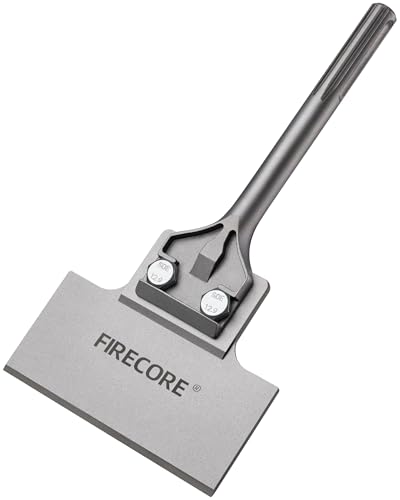

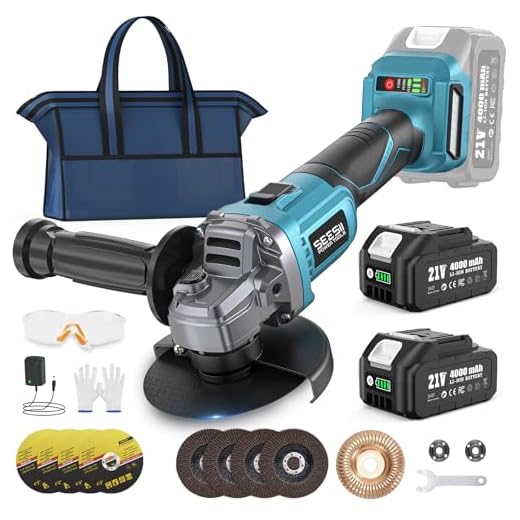


Rust is a common problem that many metal objects face over time. Whether it’s a metal gate, a bicycle, or a car, rust can be unsightly and can deteriorate the metal if left untreated. Fortunately, there are various methods available to remove rust from metal effectively. In this article, we will explore some of the most effective tips and techniques to help you get rid of rust and restore your metal objects to their former glory.
One of the first methods you can try is to use a chemical rust remover. These products are specifically designed to dissolve rust and are readily available in the market. Simply apply the rust remover to the affected areas, let it sit for a while, and then scrub away the rust with a wire brush or steel wool. This method is particularly effective for heavily rusted metal objects.
Another method to remove rust from metal is by using natural ingredients. One popular option is to create a paste using lemon juice and salt. Lemon juice contains citric acid, which can help break down the rust, while salt acts as an abrasive to scrub away the rust. Apply the paste to the rusted areas, leave it on for a while, and then scrub it off with a brush. This method is eco-friendly and can be just as effective as chemical rust removers.
If you’re looking for a method that requires minimal effort and resources, you can also try using vinegar. Vinegar is known for its acidic properties, which make it effective in removing rust from metal. Simply soak the rusted object in vinegar for a few hours or overnight. Afterward, scrub away the rust using a brush or a piece of cloth. Vinegar is a readily available household item and can be a cost-effective solution for removing rust.
In conclusion, if you’re dealing with rusted metal objects, don’t despair. There are effective methods available to help you remove rust and restore the metal to its original condition. Whether you choose a chemical rust remover, natural ingredients like lemon juice and salt, or simple household vinegar, you can tackle rust and enjoy your metal objects for years to come.
Effective Methods to Remove Rust From Metal
1. Vinegar
Vinegar, specifically white vinegar, is a versatile and cost-effective solution for removing rust from metal. It contains acetic acid, which helps dissolve rust and corrosion on the surface.
Instructions:
- Fill a container with enough vinegar to fully submerge the rusted metal object.
- Place the metal object into the vinegar, ensuring it is completely covered.
- Let the object soak in the vinegar for several hours or overnight.
- Use a brush, sponge, or cloth to scrub the rusty areas.
- Rinse the metal object with water and dry thoroughly.
2. Baking Soda
Baking soda, also known as sodium bicarbonate, is another effective and affordable option to remove rust from metal surfaces. It acts as a mild abrasive and can help break down rust.
Instructions:
- Make a paste by mixing baking soda with water. Ensure it has a thick consistency.
- Apply the paste to the rusted areas of the metal object.
- Let it sit for a few hours.
- Scrub the rusted areas with a brush or sponge.
- Rinse the metal object with water and dry thoroughly.
3. Lemon Juice and Salt
Lemon juice contains citric acid, which has rust-removing properties. When combined with salt, it creates a powerful solution to tackle rust on metal surfaces.
Instructions:
- Squeeze enough lemon juice to cover the rusted parts of the metal object.
- Add salt to the lemon juice and mix until it forms a paste.
- Apply the paste to the rusted areas, ensuring full coverage.
- Let it sit for a few hours.
- Use a brush or sponge to scrub away the rust.
- Rinse the metal object with water and dry thoroughly.
4. Commercial Rust Removers
There are various commercial rust removers available in the market that are specifically formulated to effectively remove rust from metal surfaces. These products often contain chemicals like phosphoric acid, which helps convert rust into a soluble compound that can be easily washed away.
Instructions:
- Read and follow the instructions provided on the commercial rust remover product.
- Apply the rust remover solution to the affected areas.
- Allow the solution to work for the recommended amount of time.
- Scrub the rusted areas with a brush or sponge.
- Rinse the metal object with water and dry thoroughly.
5. Prevention Tips
While knowing effective methods to remove rust is essential, it is equally important to take preventive measures to avoid rust formation in the first place.
- Keep metal objects dry to prevent moisture accumulation.
- Apply a protective coating or paint to metal surfaces.
- Regularly clean and inspect metal objects for any signs of rust.
- Store metal objects in a dry and well-ventilated area.
- Avoid exposing metal objects to excessive humidity or water.
| Method | Cost | Effectiveness | Ease of Use |
|---|---|---|---|
| Vinegar | Low | Medium | Easy |
| Baking Soda | Low | Medium | Easy |
| Lemon Juice and Salt | Low | Medium | Easy |
| Commercial Rust Removers | Medium to High | High | Easy |
Chemical Rust Removers
Chemical rust removers are an effective and convenient way to remove rust from metal surfaces. These solutions are formulated to dissolve rust and leave the metal clean and ready for further treatment or use.
There are several types of chemical rust removers available on the market, each with its own unique properties and application methods. Here are some of the most commonly used chemical rust removers:
1. Phosphoric Acid
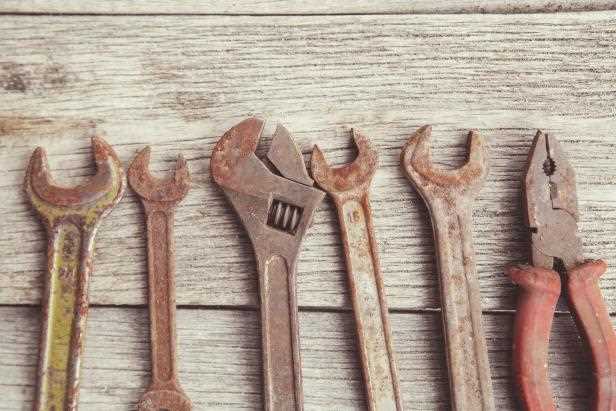
- Phosphoric acid is a popular rust remover due to its ability to chemically convert iron oxide (rust) into a soluble compound.
- It can be purchased in ready-to-use solutions or as a concentrate that needs to be diluted with water.
- Phosphoric acid is commonly used for larger rusted surfaces, such as automotive parts or metal tools.
2. Oxalic Acid
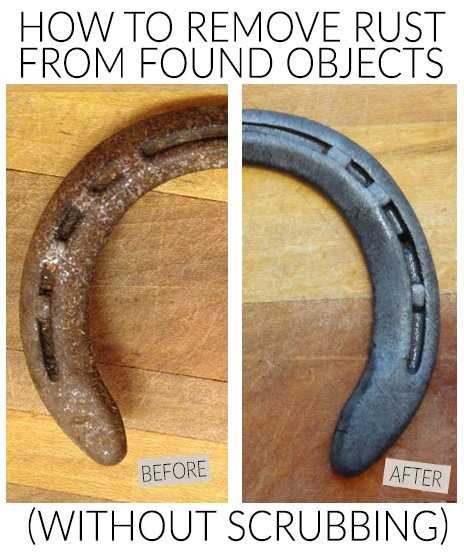
- Oxalic acid is another effective rust remover that is commonly used for smaller rust spots or stains.
- It can be used as a powder or dissolved in water as a solution.
- Oxalic acid is commonly used on rusted kitchen utensils, appliances, and other household items.
3. Citric Acid
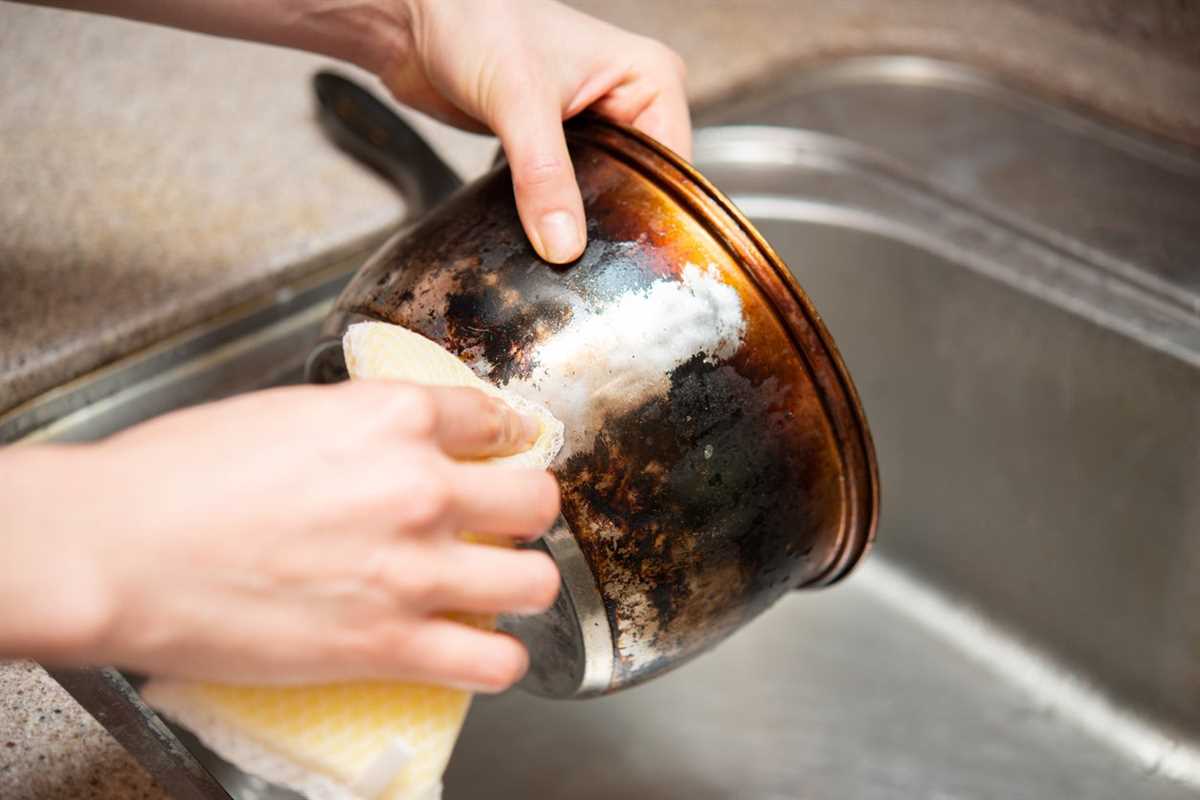
- Citric acid is a mild and environmentally friendly rust remover that is safe to use on a variety of surfaces.
- It is often used for smaller rust spots or stains, and can be purchased in powdered form or as a solution.
- Citric acid is commonly used on rusted tools, outdoor furniture, and garden equipment.
4. Rust Converters
- Rust converters are rust removers that also provide a protective coating to prevent further rusting.
- They work by converting rust into a stable compound, and then forming a protective barrier over the metal surface.
- Rust converters are commonly used on rusty metal surfaces that are difficult to clean or access.
When using chemical rust removers, it is important to follow the manufacturer’s instructions and take proper safety precautions. Always wear gloves and protective eyewear, work in a well-ventilated area, and dispose of any leftover solution or contaminated materials properly.
Chemical rust removers can be a convenient and effective solution for removing rust from metal surfaces. However, it is important to consider the type of metal and the severity of the rust before choosing the appropriate solution. In some cases, mechanical methods or professional assistance may be required for heavily rusted surfaces.
Mechanical Methods
Scratching with Sandpaper
One of the simplest mechanical methods to remove rust is by scratching the surface with sandpaper. You can start with rough grit sandpaper and gradually move to finer grits until the rust is completely removed. This method is effective for removing light rust and can be done by hand or with the help of an electric sander.
Wire Brushing
Using a wire brush is another effective mechanical method to remove rust from metal surfaces. Wire brushes come in various sizes and shapes, and can be used manually or attached to a power tool such as a drill. The stiff bristles of the brush help to scrape off the rust, revealing the clean metal underneath.
Grinding
For more severe rust or larger metal surfaces, grinding can be used to remove rust. A hand-held grinder or a bench grinder with a wire brush attachment can be used to remove the rust. Grinding can be a bit more aggressive than other mechanical methods, so it is important to use the appropriate safety equipment such as goggles and gloves.
Sandblasting
Sandblasting is a highly effective mechanical method for rust removal, especially for large or heavily rusted metal surfaces. This method involves using compressed air to propel fine sand or other abrasive materials onto the rusted surface, causing the rust to be stripped away. Sandblasting is often done by professionals and requires specialized equipment.
Natural Remedies
Vinegar
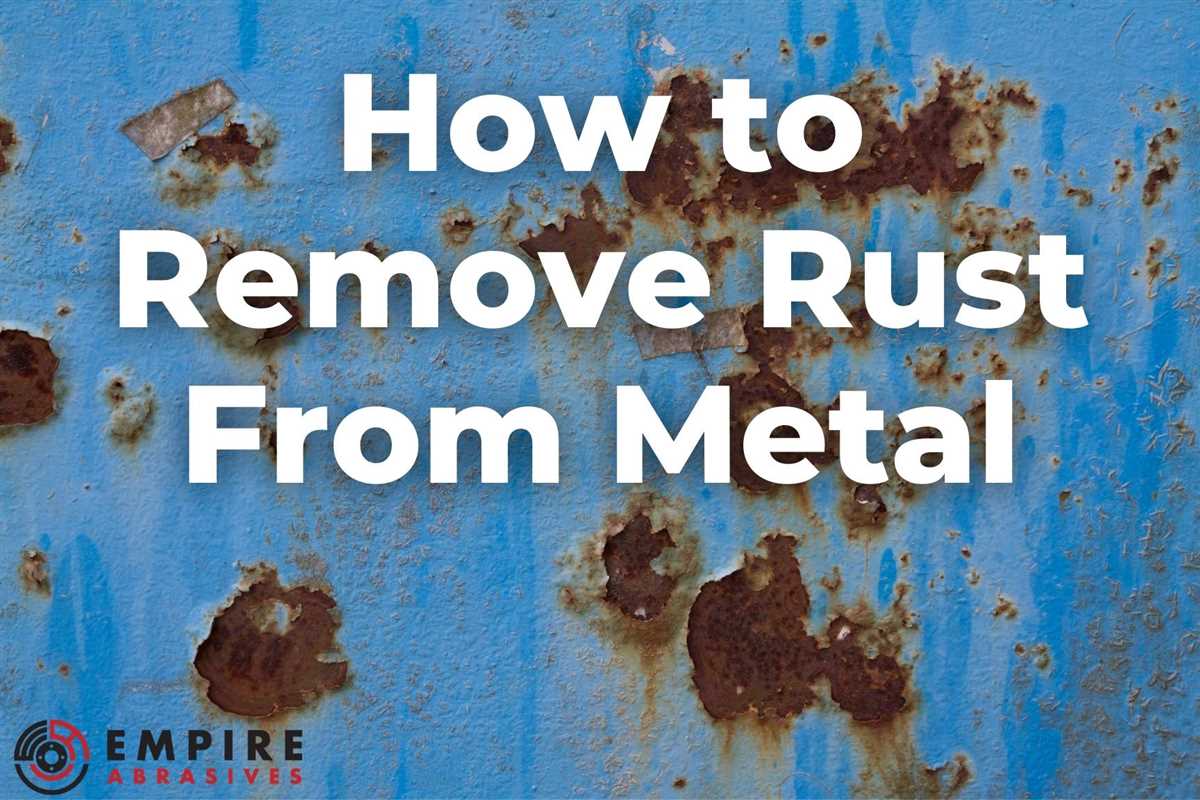
Vinegar is an excellent natural remedy for removing rust from metal surfaces. It contains acetic acid, which helps to dissolve and remove rust. Here is how you can use vinegar to remove rust:
- Soak the rusty metal object in vinegar for several hours or overnight.
- Scrub the rusted area with a brush or scrubbing pad to remove any loose rust particles.
- Rinse the object with water and dry it thoroughly.
- Optional: Apply a protective coating, such as oil or paint, to prevent future rusting.
Lemon Juice
Lemon juice is another natural remedy that can effectively remove rust from metal. The citric acid in lemon juice helps to break down rust and make it easier to remove. Here is how you can use lemon juice to remove rust:
- Squeeze fresh lemon juice onto the rusted area.
- Leave it on for a few hours or overnight.
- Scrub the rusted area with a brush or scrubbing pad to remove any remaining rust.
- Rinse the object with water and dry it thoroughly.
- Optional: Apply a protective coating, such as oil or paint, to prevent future rusting.
Baking Soda
Baking soda is a common household ingredient that can be used as a natural rust remover. It is mildly abrasive and can help lift away rust stains. Here is how you can use baking soda to remove rust:
- Mix baking soda with water to form a paste.
- Apply the paste to the rusted area.
- Scrub the rusted area with a brush or scrubbing pad.
- Rinse the object with water and dry it thoroughly.
- Optional: Apply a protective coating, such as oil or paint, to prevent future rusting.
Potatoes
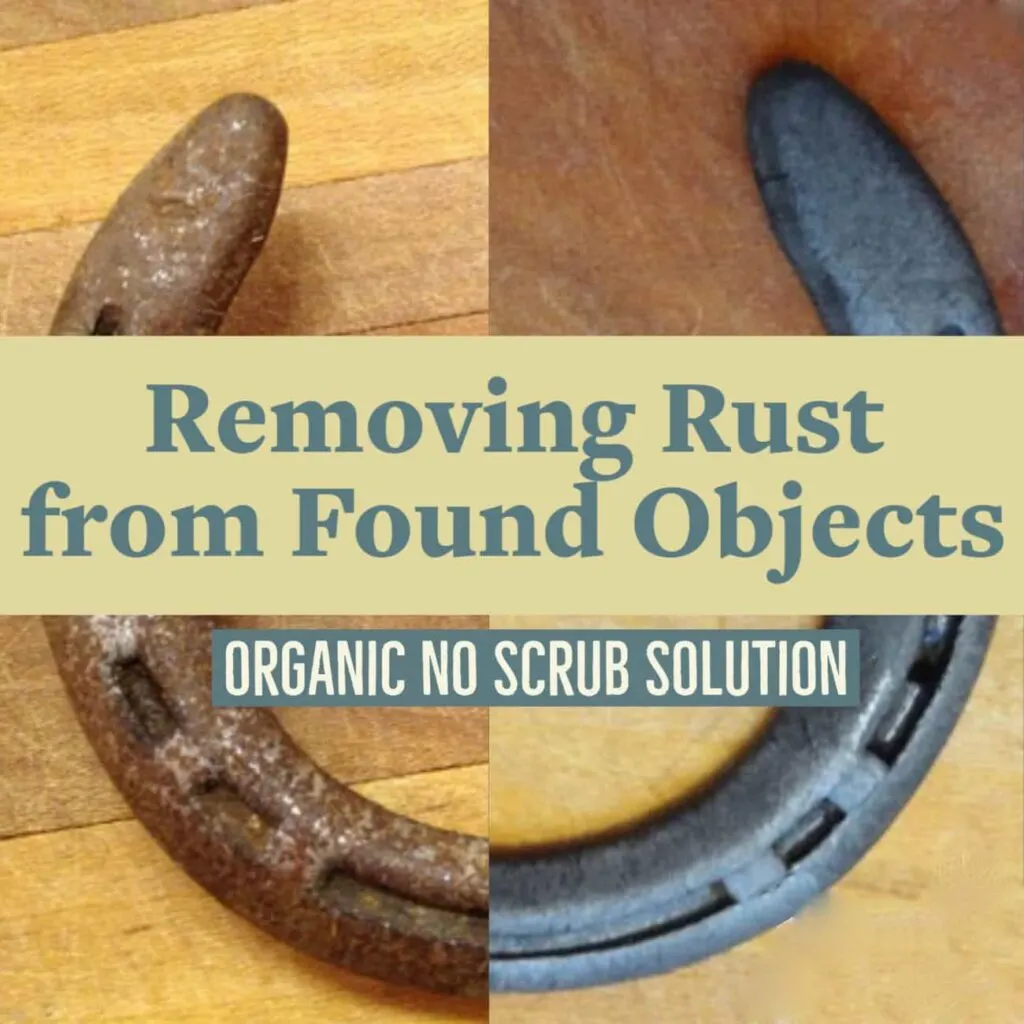
Surprisingly, potatoes can also be used as a natural remedy for removing rust from metal. The oxalic acid present in potatoes helps to break down rust. Here is how you can use potatoes to remove rust:
- Cut a potato in half.
- Dip the cut side of the potato in salt or baking soda.
- Rub the cut side of the potato on the rusted area.
- Rinse the object with water and dry it thoroughly.
- Optional: Apply a protective coating, such as oil or paint, to prevent future rusting.
Salt and Lime
A combination of salt and lime can also be used as a natural rust remover. The acid in the lime helps to dissolve rust, while the salt acts as an abrasive. Here is how you can use salt and lime to remove rust:
- Sprinkle salt on the rusted area.
- Squeeze lime juice onto the salted area.
- Leave it on for a few hours.
- Scrub the rusted area with a brush or scrubbing pad to remove any remaining rust.
- Rinse the object with water and dry it thoroughly.
- Optional: Apply a protective coating, such as oil or paint, to prevent future rusting.
Rust Removal Soak
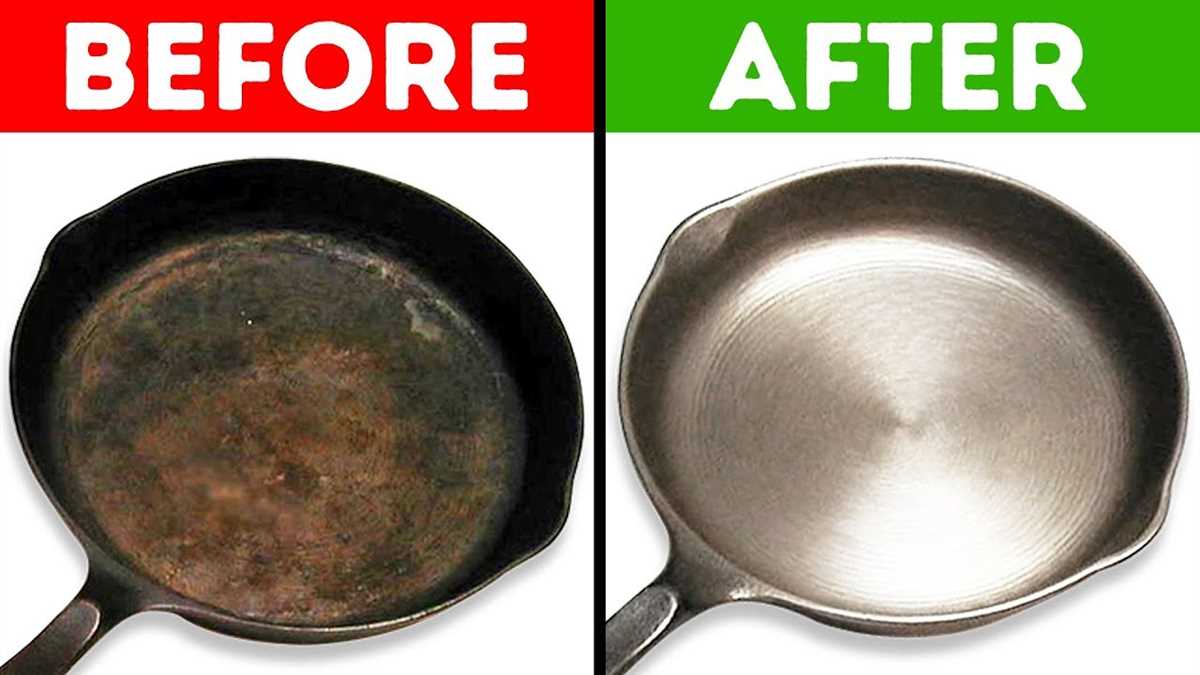
If you have multiple small objects with rust, you can create a rust removal soak using vinegar, salt, and baking soda. Here is how you can create a rust removal soak:
- Mix equal parts vinegar, salt, and baking soda in a container.
- Submerge the rusted objects in the mixture.
- Leave them soaked for several hours or overnight.
- Remove the objects from the mixture and scrub them with a brush or scrubbing pad to remove any remaining rust.
- Rinse the objects with water and dry them thoroughly.
- Optional: Apply a protective coating, such as oil or paint, to prevent future rusting.
These natural remedies can be effective in removing rust from metal surfaces. However, it is important to note that severe rust may require more powerful methods or professional help. Always exercise caution when working with rusty objects and wear appropriate protective gear.
Prevention Techniques
Rust can be a stubborn and unsightly problem on metal surfaces. Fortunately, there are several prevention techniques that can be employed to reduce the chances of rust forming on your metal items. Here are some effective methods to help keep your metal rust-free.
1. Protective Coatings
One of the most common and effective ways to prevent rust is to apply a protective coating on the metal surface. This can be done through the use of paints, varnishes, lacquers, or clear coats. These coatings act as a barrier between the metal and the oxygen and moisture in the air, preventing rust from forming.
2. Galvanization
Galvanization is the process of applying a layer of zinc or a zinc-based alloy to the metal surface. This creates a protective coating that acts as a sacrificial anode, corroding instead of the underlying metal. Galvanization is commonly used on items such as steel fences, outdoor furniture, and car parts.
3. Regular Cleaning and Maintenance
Regularly cleaning and maintaining metal objects can go a long way in preventing rust. Keep the surface clean and dry by wiping it down after each use, especially if it comes into contact with water. Remove any dirt or debris that may be present, as these can trap moisture and promote rust formation.
4. Proper Storage
Proper storage of metal items can also help prevent rust. Store them in areas that are dry, well-ventilated, and out of direct contact with moisture. Consider using desiccants or moisture-absorbing packets to further protect the metal from humidity.
5. Use Rust Inhibitors
Rust inhibitors are chemical compounds that can be applied to metal surfaces to prevent or slow down the formation of rust. These inhibitors work by forming a protective barrier on the metal, inhibiting the chemical reactions that lead to rust. They can be applied as sprays, wipes, or coatings.
6. Avoid Exposure to Water
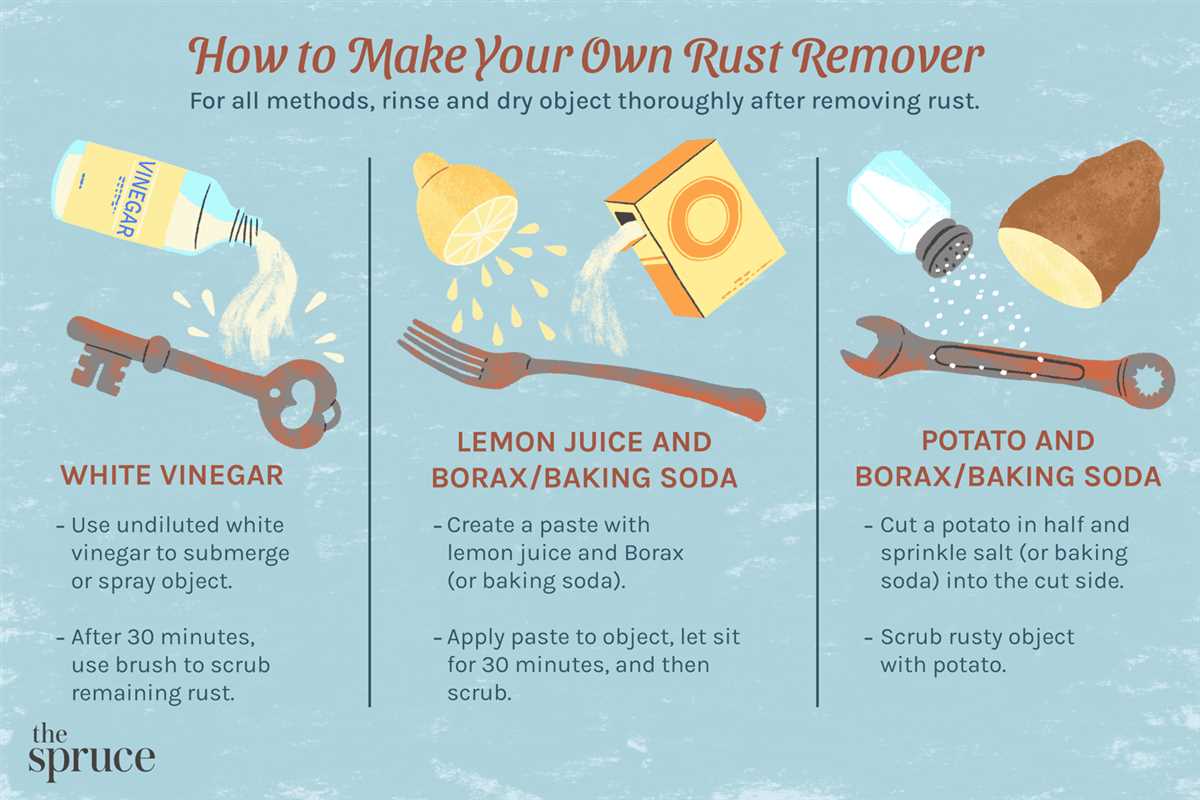
Water is one of the main culprits in rust formation. Minimizing exposure to water can help reduce the risk of rust. Avoid leaving metal items in standing water or allowing them to remain wet for extended periods of time. Consider using waterproof covers or coatings for items that are frequently exposed to water.
7. Regular Inspections
Regularly inspect metal items for any signs of rust or corrosion. Catching rust early on can prevent it from spreading and causing further damage. If you notice any rust spots, promptly remove them and apply a protective coating to prevent recurrence.
By implementing these prevention techniques, you can significantly reduce the chances of rust forming on your metal items. Taking proactive measures to protect your metal surfaces will help prolong their lifespan and keep them looking their best.
Professional Rust Removal Services
If you’re dealing with stubborn rust stains on your metal surfaces, you may want to consider hiring a professional rust removal service. These professionals have the skills and equipment necessary to effectively remove rust and restore your metal to its former glory. Here are some reasons why you might want to hire a professional:
1. Expertise and Experience
Professional rust removal technicians have extensive knowledge and experience in dealing with all types of rust stains. They know the best techniques and products to use for different types of metals and rust severity levels. By hiring a professional, you can rest assured that your rust problem will be handled properly.
2. Specialized Equipment
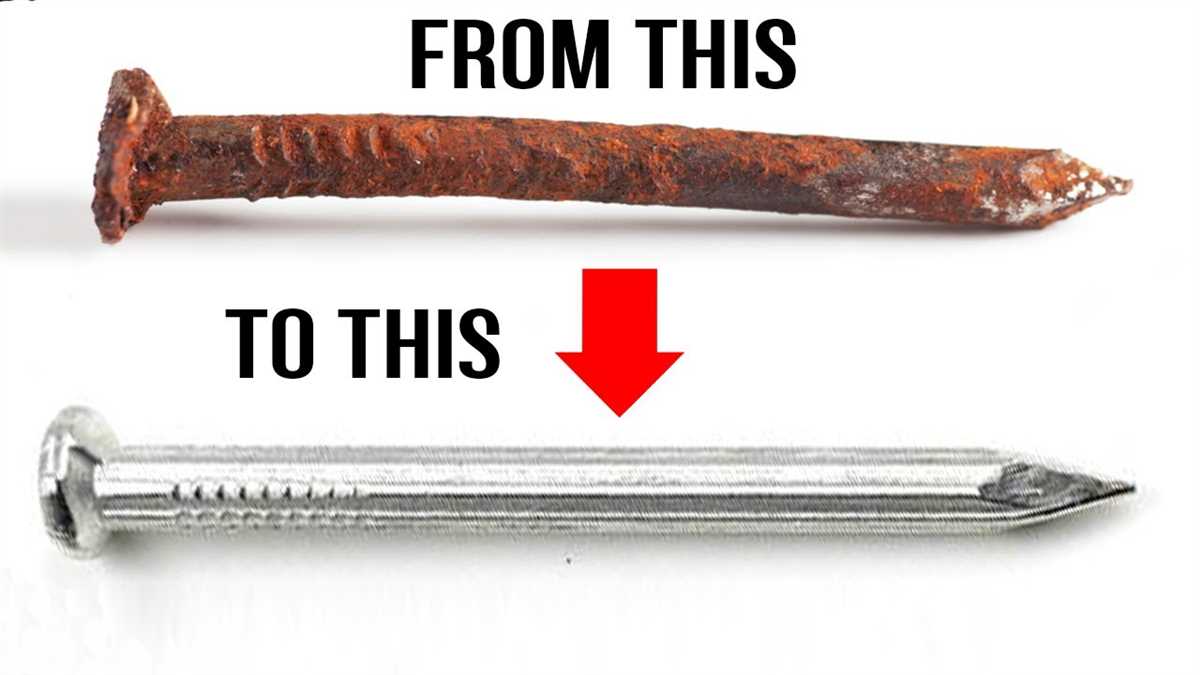
Rust removal requires the use of specialized tools and equipment that may not be readily available to the average person. Professional rust removal services have access to high-quality tools and technologies that can effectively remove rust without causing damage to the underlying metal. These tools include sandblasters, chemical rust removers, and high-pressure washers.
3. Time and Effort Savings
Removing rust can be a time-consuming and labor-intensive process. By hiring professionals, you can save yourself the hassle of researching and testing various rust removal methods. Professionals have the skills and resources to complete the rust removal process quickly and efficiently, allowing you to focus on other important tasks.
4. Restoration Services
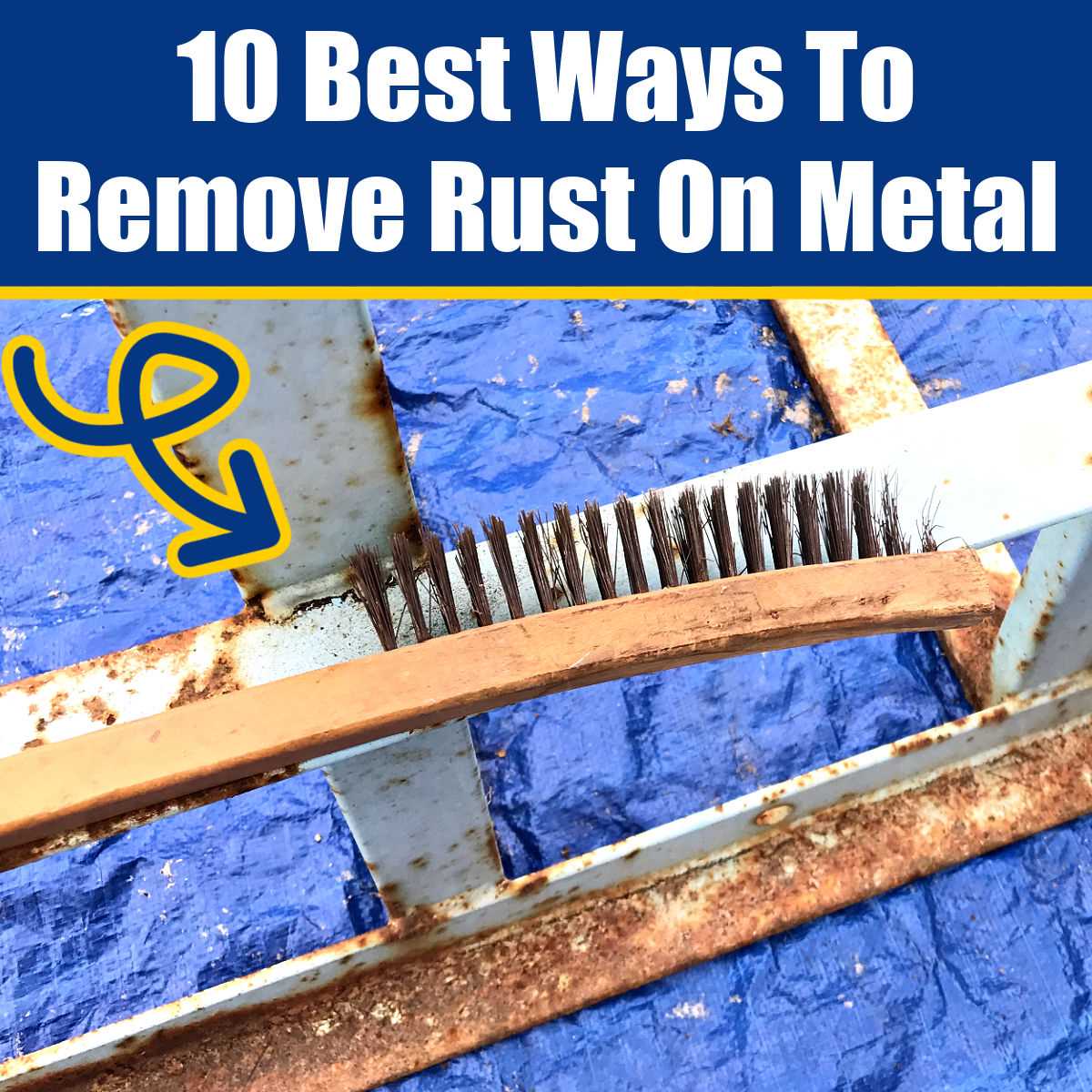
In addition to rust removal, many professional services also offer restoration services to help bring back the original appearance of your metal surfaces. They can polish, buff, and seal the metal to protect it from future rust formation. This comprehensive approach ensures that your metal surfaces not only become rust-free but also look as good as new.
5. Safety Precautions
Rust removal can involve the use of harsh chemicals and abrasive materials, which can be hazardous if not handled properly. Professional rust removal services have the necessary safety equipment and protocols in place to ensure the safety of both their technicians and your property. By hiring professionals, you can avoid potential accidents and injuries.
In conclusion, hiring a professional rust removal service can save you time, effort, and stress while ensuring effective rust removal and restoration. Consider reaching out to a reliable and experienced service provider to get rid of those stubborn rust stains for good.
FAQ
What are some effective methods to remove rust from metal?
There are several effective methods to remove rust from metal. One method is to use a wire brush or sandpaper to scrub away the rust until the surface is smooth. Another method is to soak the rusty metal in a mixture of vinegar and water, then scrub it with a sponge or brush. You can also try using a store-bought rust remover or a homemade paste made from baking soda and water. Electrolysis and use of phosphoric acid are also effective methods.
Is it possible to remove rust from metal using household items?
Yes, it is possible to remove rust from metal using household items. Vinegar, lemon juice, and baking soda are commonly used household items that can effectively remove rust. Soaking the rusty metal in vinegar or lemon juice, then scrubbing it with a sponge or brush can help remove the rust. Making a paste with baking soda and water and applying it to the rusted area is another effective method.
Can rust be removed from metal without damaging the surface?
Yes, rust can be removed from metal without damaging the surface. One method is to use a wire brush or sandpaper to gently scrub away the rust until the surface is smooth. You can also try soaking the rusty metal in a mixture of vinegar and water, then scrubbing it with a soft sponge or brush. It’s important to be gentle and not scrub too hard to avoid damaging the metal.
Are there any store-bought products that can effectively remove rust from metal?
Yes, there are several store-bought products that can effectively remove rust from metal. Rust removers that contain phosphoric acid or oxalic acid are often very effective at removing rust. These products are usually applied to the rusted area and left to sit for a certain amount of time before being scrubbed away. It’s important to follow the instructions on the product carefully to ensure safe and effective use.
Are there any precautions to take when removing rust from metal?
Yes, there are some precautions to take when removing rust from metal. It’s important to wear gloves and protective eyewear to avoid contact with any chemicals or rust particles. It’s also a good idea to work in a well-ventilated area to avoid inhaling any fumes. Additionally, if using store-bought rust removers, it’s important to read and follow the instructions on the product carefully to ensure safe and effective use.












